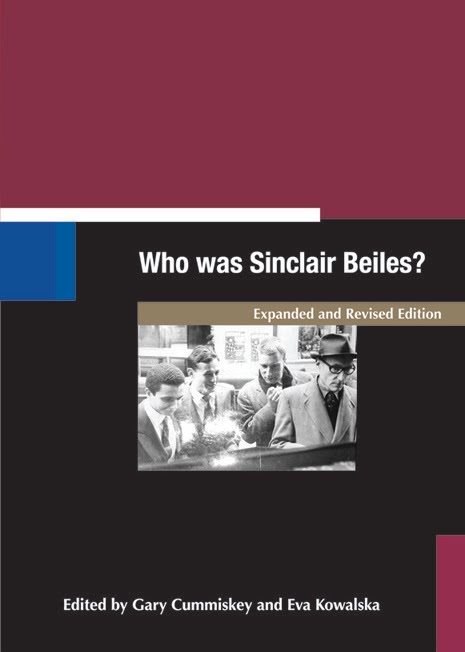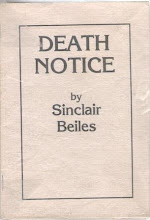The idea for Who was Sinclair Beiles? originated in early 2008, after an edited version of an interview I had conducted with Beiles in 1994 was finally published in the literary journal New Coin. I had intended to put together a small number of previously published pieces about Beiles that had been written by Alan Finlay, dawie malan and myself – the latter two had been written for a feature on Beiles published on the donga website (now offline) that challenged his exclusion from the South African literary canon. However I did not feel these would be enough to create a bound book. On the other hand I did not wish to publish about 300 pages of contributions about ‘crazy Sinclair’, with an emphasis on his erratic behaviour as a result of his mental illness, although I realised it would be impossible not write about Beiles’s illness, because it was intrinsic to his work. Instead I wanted a compilation of writings that focused mainly on Beiles as a poet by people who had met him and/or respected his work.
In biographies of the major American Beat writers, such as William Burroughs or Allen Ginsberg, Beiles is often given a mere walk-on part. For example, in Barry Miles’s detailed The Beat Hotel, more attention is given to writers who were not even involved in the Minutes to Go collaboration. Thus Beiles is represented as, to use Joyce Johnson’s phrase, a minor character. Even in South Africa his work is almost totally ignored, and it is hoped this book will lead to some serious consideration of Beiles the poet.
Who was Sinclair Beiles? is not a biography, nor does it pretend to be an authoritative work about him. It is intended rather as a tribute, and was produced while keeping both financial and time constraints in mind. When I invited Eva Kowalska – who is completing her Master’s degree on Beiles’s work – to come on board as co-editor, she, like myself, was restricted by the demands of a fulltime job and other responsibilities. So, with a few exceptions, we opted to use previously published or readily available material.
The first part consists of memoirs about, and interviews with, Beiles by malan, Earle Holmes, George Dillon Slater and myself. In the second part of the book, Kowalska examines Beiles’s poetry with an emphasis on his relationship to the American Beat poets, while in a review of the Beat Hotel Exhibition in Johannesburg, Finlay provides a snapshot of Beiles in the Rockey Street milieu in the mid-1990s. Fred de Vries, who is working on a biography of Beiles, describes some of his journeys and interviews in Africa, England and Europe as part of his research. Lastly, we examine some of the reasons for Beiles’s relative obscurity and provide a bibliography of his publications.
There is some overlap in the book, particularly in the interviews. Editorial cuts have however been kept to a minimum.
Gary Cummiskey
My experience of undertaking a study of Sinclair Beiles’s writing has been frustratingly, but intriguingly, devoid of much useful secondary material. There is very little information available about Beiles, much less so about his work. Many people know of him, though not really about him, and, aside from a handful of reviews of his earlier collections, notably Ashes of Experience, he seems to have become a name without a presence in South African literary culture. This is
unfortunate, because in addition to a colourful reputation Beiles left behind a considerable amount of poetry and plays. Though admittedly it is uneven in quality, I have found his writing to be innovative, humorous, and genuine. Though he is remembered primarily as a poet, his plays and dramatic fragments, a handful of which were staged during his lifetime, reveal a versatile writer with a talent for satire and an unusual outlook which remains interesting beyond its original context.
My involvement in this project came as a result of perceiving a lack of material on Beiles, be it factual biography or any real consideration of his work. I see Who was Sinclair Beiles? as an opportunity to do something towards remedying that gap. Secondly, it was out of a desire to assert Beiles as a poet worth considering, remembering, studying, writing about – someone who should not continue to be left out of our conceptualisation of South African and/ or Beat literature.
Rather than being a complete summary of Beiles as a person and a poet, which would be impossible, or a thorough appraisal of his life and his writing, which would be a vast and entangled project, I hope that this book is a start in the right direction. I hope that it will encourage others to reinvestigate Beiles’s writing, and that it might be useful to them in doing so. I feel that it goes some way towards establishing the worth of a poet who has been almost systematically ignored on his home ground. Through the previously published texts and new perspectives offered it might provide a context or a framework for understanding and appreciating a writer who has long been preceded by his reputation to the detriment of knowledge and appreciation of his art.
Eva Kowalska
Subscribe to:
Post Comments (Atom)


.jpg)

















No comments:
Post a Comment